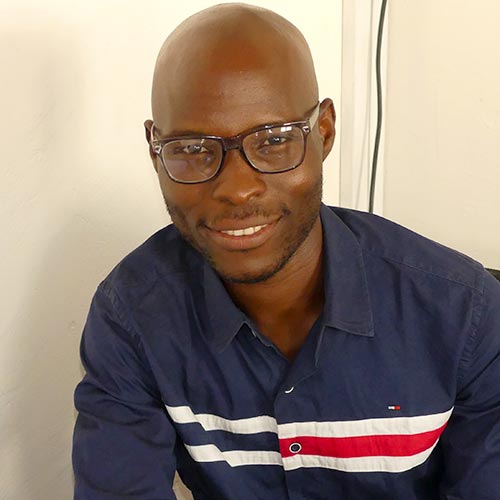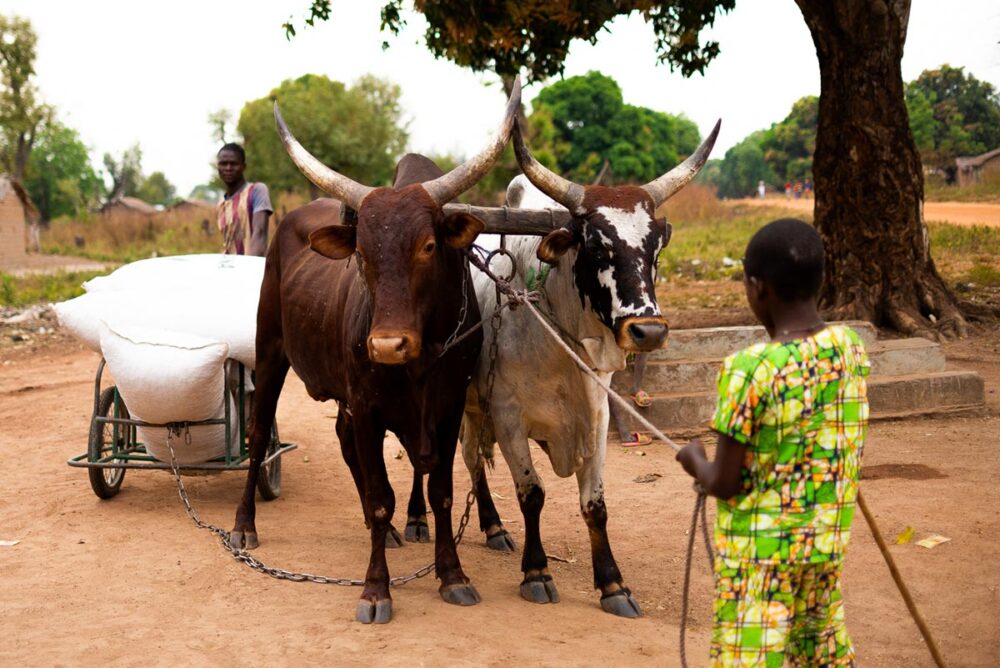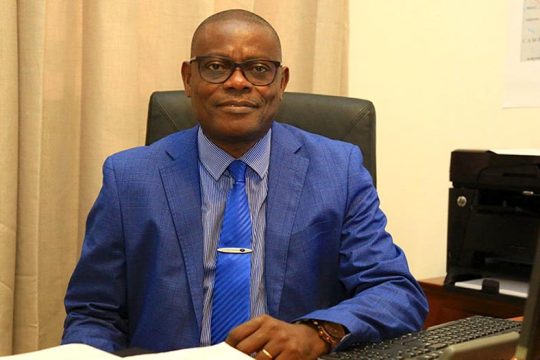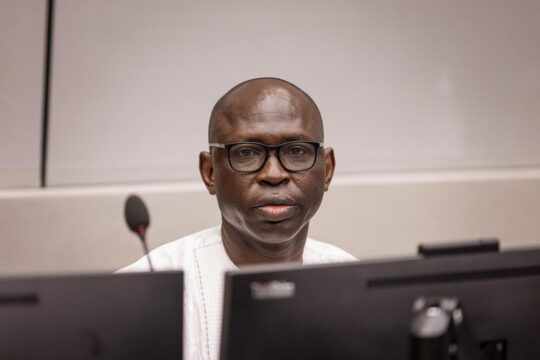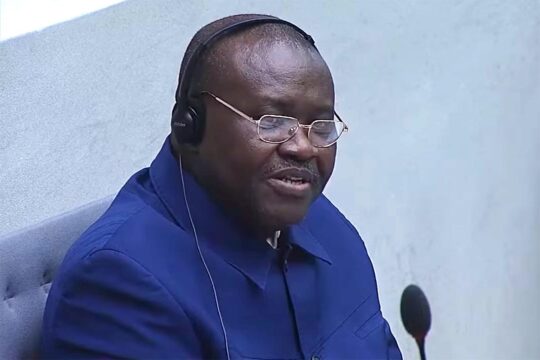“For the first time in the history of the Central African Republic, a reparation measure ordered by a court has been implemented for the direct benefit of victims who were civil parties,” wrote the information unit of the Special Criminal Court (SCC) in a press release published on September 16 in Bangui. On August 31, a team from the Service d'aide aux victimes et à la défense (SAVD), the unit responsible for implementing reparations ordered by the SCC, travelled to Paoua in the far north-west of the country to pay the symbolic sum owed to the victims and their heirs. “Forty-one people have received compensation,” said Charles Mugaruka Mupenda, head of the SAVD. “These people represent 32 families from nine civil parties, including 13 families from Koundjili and 19 families from Lémouna. In terms of individual reparations, five women victims of sexual violence, three victims of attempted murder and one victim of kidnapping received financial compensation.”
Koundjili and Lémouna are two villages located 45 and 50 km from Paoua. These localities were the target of coordinated attacks by armed men from the 3R movement on May 21, 2019. The attacks left 36 people dead in these two villages. The 3R leader at the time, Abass Sidiki, eventually handed over three of his lieutenants to the courts: Issa Sallet Adoum alias Bozizé, Ousman Yaouba and Mahamat Tahir. After an appeal before the SCC, they were finally sentenced to prison terms ranging from 20 to 30 years.
Implementation of the reparation measures is financed by the United States via MINUSCA, the United Nations mission in the Central African Republic. This funding represents a sum of 30,000 US dollars. “As the convicts are indigent, it was up to the Court to seek funding from its partners,” says Mugaruka. According to the SCC, the total amount of financial reparations awarded, individually and collectively, and handed over on August 31, 2024, amounts to 18,855,000 CFA francs (around $31,000). In addition to financial reparations, victims of sexual violence are also receiving psychosocial support from the Nengo Project.
Symbolic but insufficient
The mission that arrived in Paoua discreetly gathered the victims together to hand over the financial compensation, in the presence of the local authorities and MINUSCA officials. All the victims contacted by Justice Info confirm that they have received their sum. In accordance with the ruling of the SCC Appeals Chamber, 32 beneficiaries representing the 32 people killed in the Koundjili and Lémouna massacre each received 350,000 CFA francs (around $580). Two rape victims, who were minors at the time of the events, each received one million CFA francs (around $1,660). The three others each received 700,000 francs ($1,160). Three victims of attempted murder from Koundjili received 600,000 francs each ($1,000), while a young man from Lémouna who was tied up during the attack on his village got 200.000 francs.
“In any case, the victims were happy to see us arrive in Paoua. They expressed their joy at what they had received as symbolic reparation,” said Mugaruka.
In Paoua, Simplice Bissi, one of the beneficiaries, confirms receiving 350,000 CFA francs, paid as damages following the death in Koundjili of his brother Florentin Bissi, former substitute member of parliament for Paoua. “At last, the SCC’s promise has come true. I thank the Court for this gesture, but my late older brother left me 12 orphans. Their schooling alone costs more than 350,000 francs,” he says. Bissi suggests that the money proposed for the construction of a memorial for victims of the May 21 massacre be redirected towards the victims and their beneficiaries, as victims have rejected the idea of a memorial.
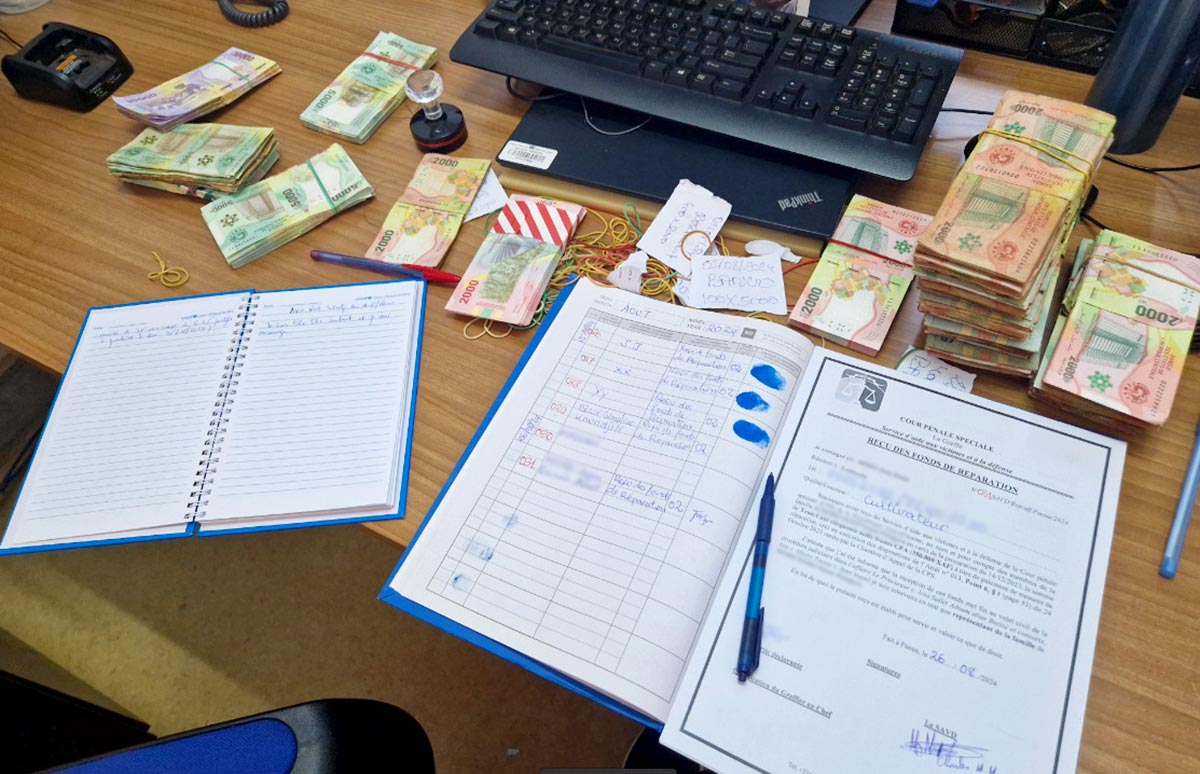
Family council at the Bissi home
A month after the SAVD mission, some of the victims told Justice Info how they use or have used the money given to them. “I received 350,000 francs in the presence of all the other family members. We had a ceremony. I called the mother of my late brother Florentin. We set aside 20,000 francs for the symbolic party and shared 30,000 francs with around 50 close relatives, so that everyone would always remember the deceased and take care of his children. You know, it’s the African family. The rest, 300,000, was given to Florentin’s first three sons,” says Simplice Bissi, representative of the Central African Observatory for Human Rights in Paoua, who lodged the complaint with the SCC about the Koundjili and Lémouna massacre. He points out that no account has been taken of the children’s schooling: “This sum cannot cover their schooling. Since they’re still studying, I’ll still have to pay for them. We don't want to spend the money on something that won’t be remembered. We’ve only paid for a few school supplies for this coming year. But we recommended to the first three boys that they should buy plots of land instead. This has been done.”
Koundjili no longer seems to attract the children of the late Florentin. Emery Bissi, Florentin’s second son, is 16 years old and in fourth grade. He bought land in Paoua. Since the tragedy of 2019, he no longer wants to stay in Koundjili. He is staying with his paternal uncle in Paoua. “If God keeps me alive, when I grow up, I'll build a house on this land,” he says. Apollinaire, the eldest son, is a regular trader between Bocaranga and Paoua. He bought his plot of land in Bocaranga, thanks to these reparations. And the third son chose to settle in Ndim, not far from Koundjili.
Goats, calves and bulls
Other victims invest their reparations in schooling, farming or livestock rearing. “I paid for my two children’s schooling this year. I’ve also bought three goats and two calves for breeding. And to restart my farming activities, I paid for five sacks of groundnuts for sowing,” explains Reine, who was a victim of rape when she was a minor and was compensated for one million CFA francs. But she will have to find other ways to pay for the clearing of her field.
Patiente, another rape victim, paid for bales of cotton and hopes that the government will soon launch the new cotton campaign to sell her products. With the 700,000 CFA she received, she paid for schooling and school insurance for her ten children and the eight orphans left by her sister.
Another investment in agriculture was made in the large Houtia family, where there were three victims of the Koundjili massacre. The heirs of Mitterrand Houtia, who received 350,000 CFA francs, bought a pair of bulls and a plough. They plan to join the Paoua sub-prefecture white bean producers’ cooperative, which produced 230,000 tonnes of beans this year.
Huge needs in sight
Most of the victims have taken advantage of this financial compensation to restart their businesses, fields or livestock, or to meet vital needs. They offer testimonials of satisfaction that allows them to forget their bruised past for a while. Olivier Manguereka, one of the victims’ lawyers, is also reasonably satisfied, even though he was not involved in the Paoua trip. “I'm partly satisfied,” he says. The amounts are certainly “tiny but symbolic, but what is very important to note is that all the victims have received something,” says the lawyer.
But this battle is not yet over for the SCC, which must prepare for other challenges in the area of reparations. The $30,000 granted by the United States has been used up by the Paoua victims, and “the issue of reparations must not be left to the Special Criminal Court alone”, according to Mugaruka. “It is an issue that concerns everyone: the State, NGOs, partners and civil society,” he says. “In the Paoua trial, there were few victims. But it’s not certain that will be the case for future trials. I imagine that if we have a thousand victims, our needs will be multiplied by 20 or 30 perhaps. So where will these funds come from? I think it will come from a collective effort. On the Court’s side, we are continuing our dialogue with our partners and with the government to increase support for reparations. At the same time, we are remaining creative to see what other avenues can be explored, and to see how we can take into account the enormous needs of the future.”

